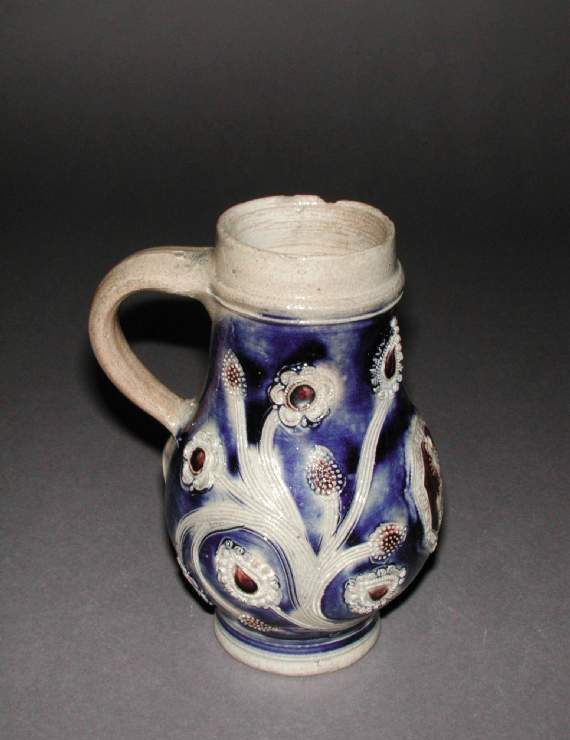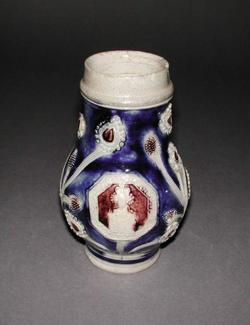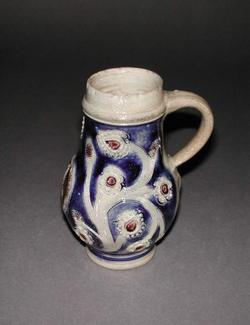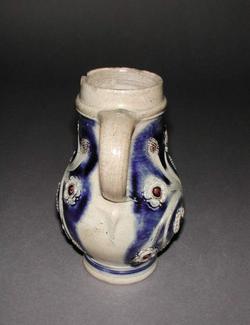Current Location: Gallery 27 (Glaisher)
Maker(s)
Production:
Unidentified Westerwald pottery
Entities
Categories
Description
Grey salt-glazed stoneware with relief decoration painted in manganese-purple and blue. On the front is a half figure of Queen Mary II of England with her name and title, flanked by branching stems of stylized flowers and buds
Stoneware, with applied moulded decoration, painted with manganese-purple and cobalt blue (as smalt), and salt-glazed. The pear-shaped mug has a wide neck and a loop handle. On the front, in an octagonal panel flanked by branching stems scratched into the body and terminating in applied formal flowers and buds against a blue ground, is a half-figure of Queen Mary II of England with the legend: 'MARIA. D. G. MAG. BRIT. FRANC. ET. HIB. REGINA' (Mary, by the Grace of God, Queen of Great Britain, France, and Ireland).
Notes
History note: Sotheby's, 5 June, 1905, lot ; Dr J.W.L. Glaisher, FRS, Trinity College, Cambridge
Legal notes
Dr J. W. L. Glaisher Bequest
Measurements and weight
Height: 14.3 cm
Width: 11.5 cm
Acquisition and important dates
Method of acquisition: Bequeathed
(1928-12-07)
by
Glaisher, J. W. L., Dr
Dating
17th Century, Late
William III and Mary II
Circa
1689
-
1694
Note
The stoneware industry in the Westerwald developed first in the area of three villages, Höhr, Grenzau and Grenzhausen (currently Höhr-Grenzhausen), where potters formed a guild in 1643, and expanded to other villages in the area. Production increased greatly after the end of the Thirty Years War in 1648, and Westerwald stoneware was exported on a large scale to other parts of Europe, including Britain. This mug was presumably exported to England where Queen Mary II reigned with her husband, William III, from 1689 until her death from smallpox in 1694. Typically Westerwald stonewares had a pale grey body with incised or applied relief decoration coloured in blue derived from cobalt, or blue and manganese-purple applied before salt-glazing during firing.
School or Style
Baroque
People, subjects and objects depicted
Components of the work
Deoration
composed of
smalt
( produced by fusing cobalt with an alkali, usually potash, and sand, grinding to a powder and mixing with water)
Decoration
composed of
manganese-oxide
Surface
composed of
salt-glaze
Base
Diameter 5.5 cm
Body
Materials used in production
grey
Stoneware
Inscription or legends present
- Text: MARIA. D. G.MAG.BRIT.FRANC. ET. HIB. REGINA
- Location: Around the image of Queen Mary
- Method of creation: Moulded in relief
- Type: Inscription
References and bibliographic entries
Identification numbers
Accession number: C.2044-1928
Primary reference Number: 73044
Old object number: 2261
Stable URI
Audit data
Created: Saturday 6 August 2011
Updated: Tuesday 30 April 2024
Last processed: Tuesday 15 July 2025
Associated departments & institutions
Owner or interested party:
The Fitzwilliam Museum
Associated department:
Applied Arts







